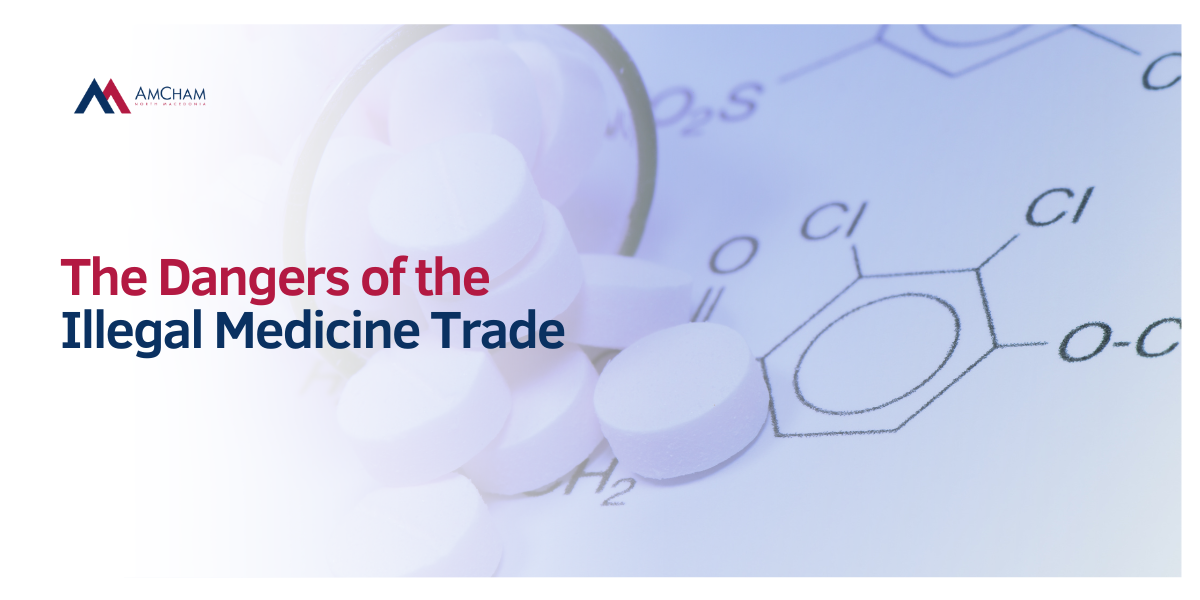Author: Marijan Dedikj, Pharma Account Manager at React Balkan and Member of the AmCham IPR Task Force
*The article in Macedonian language, published by Kapital can be found at the bottom of this page.
The illegal medicine trade poses significant risks to public health, safety, state budgets, and legitimate medicine manufacturers. This criminal activity typically involves the production and distribution of:
- Counterfeit medicines: These are medicines presented as authentic but are not produced by the legitimate rights holder, imitating the real product.
- Substandard medicines: These medicines are legitimately produced but fail to meet the required quality, safety, and efficacy standards. They may be improperly manufactured or stored or fail to meet regulatory requirements for distribution. Expired medicines are an example of substandard medicines.
- Falsely labeled medicines: These medicines have labels or packaging containing incorrect or misleading information about their identity, composition, source, or purpose. This can include mislabeled active ingredients, incorrect dosages, or false information about the manufacturer, safety, or efficacy of the medicine.

According to the World Health Organization, the illegal medicine trade results in tens of thousands of deaths and billions of dollars in financial losses annually. Beyond the direct health consequences for users, illegal medicines can erode public trust in the health system. Additionally, the trade in illegal medicines is detrimental to legitimate pharmaceutical companies, reducing their sales and income, and posing a serious threat to their brand. For instance, if users suffer harmful effects from an illegal medicine, the blame may unjustifiably fall on the legitimate manufacturer, unfairly diminishing confidence in its products. This can demotivate legitimate manufacturers from investing in research and development, hindering the discovery of solutions to health challenges.
Addressing the Illegal Medicine Trade
Addressing the illegal medicine trade requires a comprehensive approach involving international cooperation, public awareness, effective and indiscriminate law enforcement, regulatory reform, and strengthened oversight mechanisms. In this effort, special attention should be given to the following areas:
Raising Public Awareness of the Dangers of Illegal Medicines
It is crucial to raise awareness among the public about the dangers of illegal medicines. Developing consumers’ skills to recognize and report suspicious products is essential. Here are several indicators that may suggest a product is an illegal medicine:
- Packaging containing more than one type of product or products from several different companies that are not properly packaged and arranged.
- Inadequate quality of packaging, including poor quality, incorrect colors, or spelling errors.
- Deviations from the standard appearance of serial numbers. Serial numbers and manufacturing data are critical elements. A serial number is unique to a particular manufacturing batch of a medicine and helps organize and catalog the medicine. Serial numbers typically consist of digits or a combination of digits and letters, usually between 5 and 12 characters. Manufacturers place these numbers in consistent locations on the medication’s package or label. Deviations from this standardization may indicate an illegal medicine.
Consumers should also be informed about where and how to report suspicions of illegal medicines. In Macedonia, counterfeit medicines or any doubts regarding the safety of medicines can be reported to the Agency for Medicines and Medical Devices of Macedonia (MALMED). MALMED is responsible for supervising the trade in medicines and medical devices in the country and is authorized to act on such reports. The official channels for communication with MALMED are:
- Address: Blvd. “St. Cyril and Methodius no. 54”, Skopje
- Phone number: +389 2 5112 394
- Email: info@malmed.gov.mk
- Website: malmed.gov.mk
Developing the Capacities of Institutions, Health, and Pharmaceutical Workers
Continuous development of the capacities of police and customs services, as well as health and pharmaceutical workers, is necessary to identify and combat the illegal medicine trade. This can be achieved through employee training and investment in technical resources. These resources include technologies that enable tracking the movement of medicines through the supply chain and digital verification systems that confirm the authenticity of products before use.
International Cooperation
Strengthening cooperation between medicines agencies and authorities responsible for state and public security from countries in the region, as well as relevant regional and international organizations such as EUROPOL, INTERPOL, the Southeast European Health Network (SEEHN), and the Balkan Medical Union, is key to tackling the illegal medicine trade. Such cooperation enables timely information sharing, coordination of efforts among different countries, and joint operations against networks involved in the illegal medicine trade.
Adoption and Effective Implementation of Appropriate Regulations
Laws regulating the illegal medicine trade need to be revised to address current threats and meet the challenges associated with new technologies used by counterfeiters. Effective implementation requires non-selective controls at border crossings, pharmacies, distributors, and online platforms for the sale of medicines. Identified shortcomings should be sanctioned accordingly to ensure compliance.

